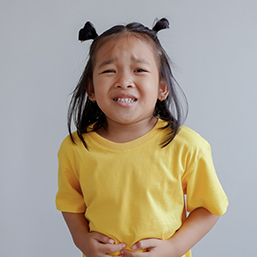
Every parent knows the challenges of childhood fears, as it is normal and common for children to develop fears as they grow and explore the world around them. But for the families dealing with emetophobia – an intense, irrational fear of vomiting – the struggle goes far beyond typical childhood worries.
\n \nThis complex phobia is experienced by one to seven percent of people, and can transform everyday life into a landscape of constant worry, isolation, and emotional distress for both the child and the child’s family.
\nNo one likes to get sick, but for people with emetophobia, the fear of vomiting or seeing other people vomit can consume a child's entire world and be extremely distressing. Children will often become hypervigilant of those around them, constantly scanning their environment to see if someone near them might get sick. They also become very aware of their own bodily sensations and will often scan their body to see if there are any physical signs in their body that suggest they might get sick. Feelings of nausea, dizziness, lightheadedness, or stomach aches are often very distressing for children with emetophobia. Over time, emetophobia can lead to social isolation, nutritional challenges, difficulty attending school or participating in extracurricular activities, and avoiding various people and/or places. Children may develop rituals to prevent themselves or others from getting sick and parents may begin to provide significant levels of accommodations.
\nCommon parental accommodations include modifying meals, avoiding restaurants, constantly providing reassurance, avoiding long road trips, or maintaining close or constant contact with their child. This often leads to significant levels of stress for the entire family. Parents may feel frustrated or helpless trying to calm their child’s worries. Siblings might struggle with disrupted routines or misunderstand the severity of the issue. They may also feel overshadowed by the intense focus on the anxious child's needs. In order to keep the fear and distress manageable, family vacations, social gatherings, and spontaneous activities become carefully orchestrated events designed to minimize potential triggers. While parental accommodations appear to be helpful in the short-term, parental accommodations worsen emetophobia over time. It is also important to remember that the child’s behavior stems from genuine fear, not defiance or stubbornness. Empathy and understanding are key to creating a supportive environment for the child to take back their control over their emetophobia.
\nWhat Causes Vomiting Phobia in Children?
\nThere is no single cause of vomiting phobia, but it often develops from a combination of factors. A traumatic vomiting experience, such as a severe stomach bug, or witnessing a peer vomit, can create a lasting impression on a child. These experiences and their corresponding memories over time can lead a child to develop emetophobia. Children may also pick up on a caregiver’s anxieties or cautious behaviors related to illness, and there may also be a genetic predisposition to emetophobia or anxiety disorders in general. Children with emetophobia will often report that their parent was or is also afraid of vomit, and they can recall their parents having strong emotional reactions when they or their siblings vomited.
\nSome children are also naturally more sensitive to bodily sensations, amplifying their fear of physical discomfort. For these children, any bodily sensation that suggests they may get sick provokes intense fears and often leads to a lot of reassurance-seeking or avoiding situations that might induce similar physical sensations (e.g., rides). Finally, children with pre-existing anxiety disorders or obsessive-compulsive disorder (OCD) are more likely to develop emetophobia. There is some research to suggest that emetophobia might even be a subtype of OCD. Overall, family dynamics, past experiences, and individual sensitivities can all contribute to the development of emetophobia.
\nHow to help your child with emetophobia
\nVomiting is gross and no one likes to vomit or wants to get sick, so it is important to validate your child’s fear as something that makes sense. Also let them know that if they get sick, they’ll get sick, and then it will be over. It is common for parents to try to reassure their child that they or someone else won’t get sick, but it is important the child knows it is a possibility that they can handle. It is also important for parents to stop accommodating their child’s fear. While it’s natural to want to protect your child, over-accommodating their fears (e.g., letting them skip school or avoid foods) can reinforce their anxiety.
\nParents need to strike a balance between being supportive and encouraging gradual exposure. If your child’s fear of vomiting is beginning to significantly impact their functioning or getting in the way of things they want to do or once enjoyed, it is probably time to seek professional help. Other red flags that suggest it is time to get professional help include: persistent refusal to eat or drink enough to maintain proper nutrition, avoiding school or social activities, frequent panic attacks or meltdowns related to vomiting fears, or extreme rituals or compulsions that interfere with daily life. Emetophobia might seem overwhelming, but it's not insurmountable. With understanding, professional support, and dedicated family support, children can learn to manage their anxiety and thrive.
\n\n
Dr. Lisa Pascal is a registered psychologist with over eight years of experience in assessing and treating children with severe and complex mental health concerns. Her current private practice specializes in treating children and teens with emetophobia, OCD, anxiety, tics, hair pulling, and skin picking. She also offers comprehensive psychoeducational, ADHD, and mental health assessments. For more information on the services Dr. Lisa offers, email
\n
See our related articles:
\n
Calgary’s Child Magazine © 2025 Calgary’s Child